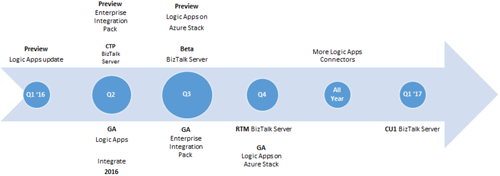News
Microsoft Shares Roadmap for Next-Gen BizTalk Server
- By Kurt Mackie
- January 05, 2016
Microsoft recently detailed some upcoming milestones for its integration solutions, including BizTalk Server 2016 and Azure.
The Azure integration approach and new BizTalk Server product roadmap details are referenced in a Microsoft whitepaper (PDF) released late last month, as cited by Microsoft MVP Steef-Jan Wiggers. He contended in a Dec. 27 blog post that Azure services such as Service Bus, Logic Apps and API Apps (which are part of the Azure App Service) will enable "modern integration" for organizations via REST and JSON, dispensing with the need to use "bulky" message brokers to support line-of-business systems.
Wiggers was bullish about the role that Azure services, which integrate BizTalk Server capabilities, will play in providing this integration support. However, he added that it's still too soon to abandon using BizTalk Server on premises "since the [Azure] cloud technology for integration is currently not mature enough."
That situation, though, will change in "a few months to over a year," Wiggers contended.
Microsoft's whitepaper included the following timeline, showing the next BizTalk Server product releases, as well as some related Azure service milestones:
 [Click on image for larger view.] BizTalk Server and Azure Logic Apps timeline for 2016. Source: Microsoft whitepaper (PDF)
[Click on image for larger view.] BizTalk Server and Azure Logic Apps timeline for 2016. Source: Microsoft whitepaper (PDF)
The coming BizTalk Server "2016" product will get commercially released in Q4 2016, following beta release in Q3. Its release will follow the "general availability" (GA) releases of "Windows Server 2016, SQL Server 2016, and Visual Studio 2015," according to the whitepaper. The new BizTalk Server product will align with those 2016 products, the whitepaper added. For instance, SQL Server 2016's AlwaysOn high-availability feature will be supported by BizTalk Server.
Microsoft is planning the next release of its Host Integration Server product according to the same schedule as its next BizTalk Server product, according to the whitepaper. Host Integration Server is used to extend Windows to other systems, such as IBM mainframes, according to Microsoft's TechNet library description. The next Host Integration Server will have "new and improved BizTalk adapters for Informix, MQ and DB2," the whitepaper indicated.
Microsoft also offers BizTalk Services as part of its Azure services. BizTalk Services is described by Microsoft as its "integration platform as a service" or iPaaS solution. Azure BizTalk Services will reach "general availability" (GA) product release in April 2016, according to the whitepaper.
While Logic Apps are currently offered as part of the Azure App Service, Microsoft is planning to make Logic Apps available for use on premises, too, either from the customer's datacenter or from the infrastructure of a hosting provider. Logic Apps will be enabled in this way via Azure Stack, a bundle of APIs and tools consistent between Azure infrastructure and Microsoft's 2016 server products. Microsoft is adding the ability to run Logic Apps on premises to address security and compliance requirements that some organizations may have that preclude tapping Azure services. The premises-based Logic Apps solution will be available in preview form in Q3 2016, with GA expected near year's end, according to the whitepaper.
Microsoft is planning to establish future "parity" between its Logic Apps and BizTalk Services. Logic Apps, though, will get the focus, going forward, according to the whitepaper.
"Customers should be assured with our approach that we fully intend to provide all the capabilities they have today in BizTalk Services represented in our Logic Apps and App Service offering," the whitepaper explained. "Therefore, for new integration solutions we recommend customers target Logic Apps for their cloud-based integration workloads."
In other integration details, the whitepaper explained that Microsoft's Azure App Service will get a new Azure API management capability sometime "by the end of 2016."
About the Author
Kurt Mackie is senior news producer for 1105 Media's Converge360 group.